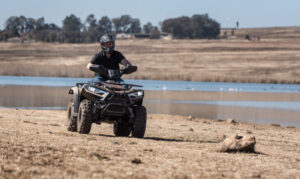Written by Wnadile Sihlobo, Chief Economist at Agbiz
We are in a tricky crop season. At its start, we expected a recovery from the 2023-24 season characterised by the El Niño induced drought damage.
Indeed, various regions of South Africa received much-needed rains in October, permitting the start of the summer grains and oilseeds planting and a recovery in the grazing veld. The farmers were also upbeat, encouraged by the prospects of rain and the moderation of various input costs – fertilisers and agrochemicals. At the end of October 2024, the South African farmers intended to increase the area plantings for summer grains and oilseeds by 1% to 4,47 million hectares in the 2024-25 season, which is broadly inline with the long term average. But from November 2024, soon after some regions finished planting and before others could plant, South Africa struggled with intense heat, affecting crops and the grazing veld. Various areas of Limpopo, Mpumalanga, and the Free State were amongst the most affected by the November heat.
Encouragingly, it started to rain in most regions of the country from mid-December 2024 to January 2025 and continues to rain at the time of this note’s publication. The grazing veld promises to recover, but there remains a worry now that the areas that have not yet completed the planting are struggling to get into the field because of the wet weather conditions. It is already late for planting, as the country’s traditional optimal planting window closes at the end of December. Still, there have been many seasons where farmers planted crops at the start of January and went on to have a robust harvest. This year’s challenge is that we are at mid-January with still a minimal breather from the heavy showers in some regions. Thus, we fear there could be late planting if farmers proceed even after mid-January.
The main risk with planting late is the possibility of frost damage later in the season. If the country is fortunate to be spared of frost, as we have seen in recent seasons, the prospects for a better harvest remain even for late plantings. So far, it is challenging to ascertain how much of the summer grains and oilseeds has been planted on time and how much is late. We will better understand the preliminary plantings when the Crop Estimates Committee releases its data on January 28. Still, even this data will be tentative, given the possible late plantings that may be tough to account for. The better view of the actual area that farmers may have planted and the first summer crop production forecast will be released by the Crop Estimate Committee on February 27. We should pay close attention to this particular dataset to gauge the direction of the season.
We are not worried about the rainfall prospects for the coming months regarding the late-planted regions. The global weather forecasters suggest we have a late arrival of La Niña, which could dominate through February–April. Under such conditions, we gain comfort that even if the crop pollinates in March, there will still be a high chance of sufficient moisture to support production. Sugarcane production will also benefit from this rain.
We are also comforted by the possibility that the grazing veld for the livestock may receive much-needed support. The one aspect we may have to pay close attention to in a wet season is animal diseases. Still, we do not see a specific significant risk, but we are flagging this as an issue worth monitoring.
Outside the field crops and livestock, the possible improvement in dam levels will support irrigation in horticulture. The fruit industry, wine, grapes, and vegetables already have much better production conditions because of the better dam levels and stable electricity supply. Better rain will only add to the already better production conditions in the summer rain provinces of South Africa. In the Western Cape, a winter rainfall province, the dams remain at better levels to support farm irrigation until the arrival of the winter rains. The major focus for the Western Cape is the port operations as the deciduous fruit export season continues. Agbiz is working with various stakeholders and Transnet to support the Port of Cape Town teams with operations.
Overall, these narratives demonstrate the tricky season that South Africa is in for 2024-25. Still, from a general agricultural performance perspective, we are optimistic that there will be a recovery this year from the past season. Indeed, various regions of the country and commodities may not enjoy a solid recovery from last season’s difficulty and financial burden. Still, the broad national picture promises to be better this year.
This article first appeared in the Agbiz eNewsletter, 16 January 2025. Find it here.
Feature photo Stijn te Strake on https://unsplash.com



